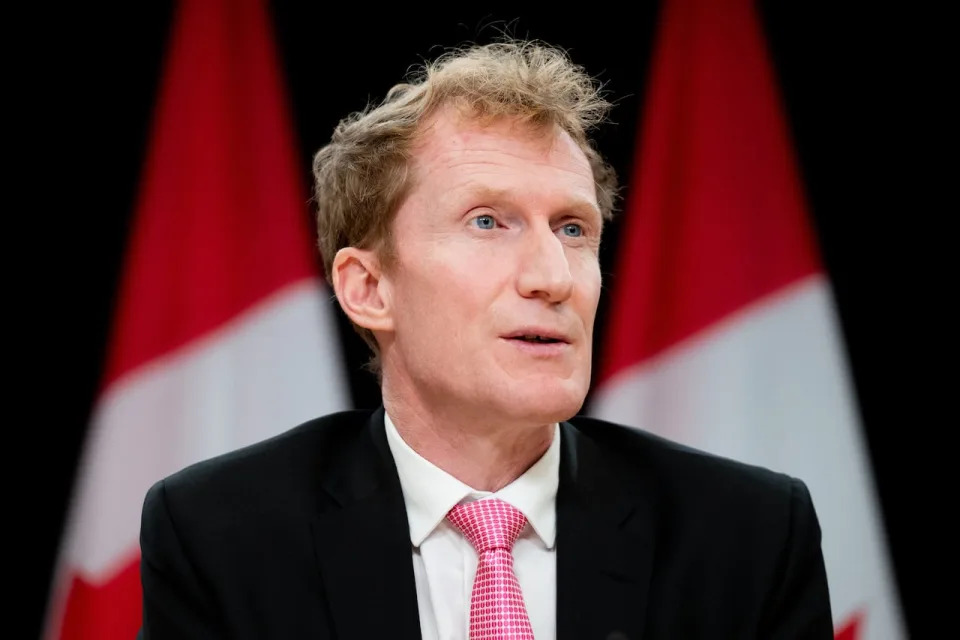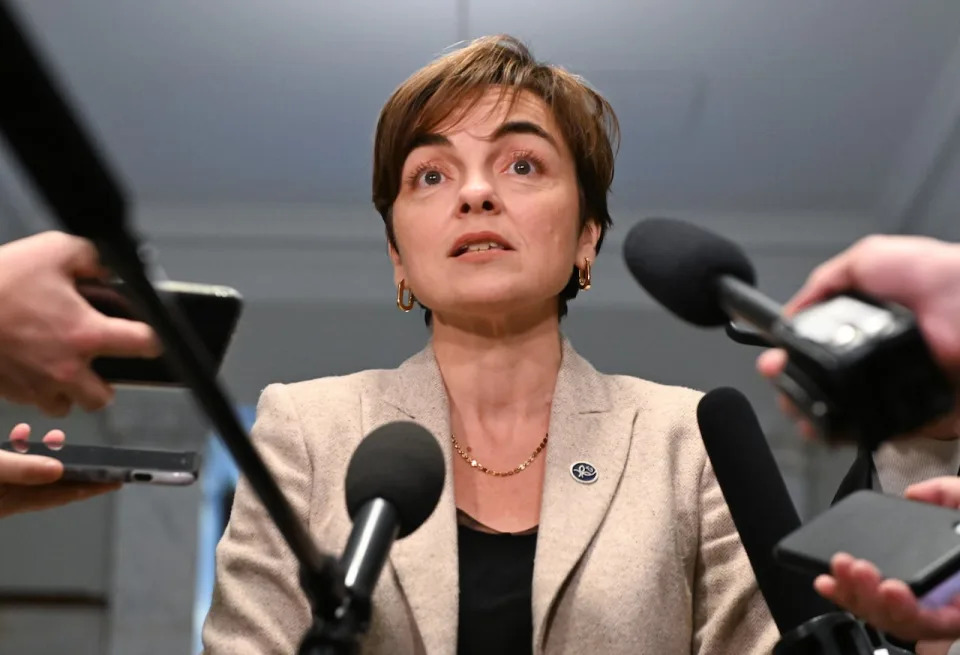CBC
Mon, March 4, 2024

Federal Immigration Minister Marc Miller says he's ready to go against Quebec's policies to reunite loved ones in the province more quickly.
(Spencer Colby/The Canadian Press - image credit)
After several months of asking the Quebec government in vain to increase its family reunification capacity, Federal Immigration Minister Marc Miller says it's time for his government to pull rank.
Miller says his ministry will begin issuing permanent residence permits to those looking to unite with their loved ones in Quebec, regardless of the province's self-imposed cap on applicants, which he describes as "artificially low."
"We're talking about people who are husbands, wives, parents, grandparents, who are waiting unsuccessfully to be reunited with their families in Quebec," said Miller in an interview with Radio-Canada, calling the backlog a humanitarian crisis.
"For me … it's a question of social justice."
Quebec's family reunification envelope is capped at around 10,000 applicants per year — a threshold that falls far short of the demand.
Miller said he's been "begging" Quebec Immigration Minister Christine Fréchette for months to lift the cap and allow more people to enter the province, but now, he's tired of waiting.
In a letter sent to Fréchette on Sunday and obtained by Radio-Canada, Miller said he had "a moral duty to find a solution" to Quebec's "refusal to reunite families more quickly."
He has instructed his ministry to begin processing all applications for permanent residence from family reunification applicants who have received the proper documents from Quebec, his letter reads.
Miller said that amounts to approximately 20,500 applications, as of Jan. 31, 2024.
If the backlog continues to worsen, Miller said his ministry will continue to grant permanent residence to applicants within the usual timeframes, "even if it means exceeding the levels set by the [François] Legault government."
Wait for family reunification longest in Quebec
Ottawa's move could create further tensions with the Coalition Avenir Québec government, which is already the subject of a Superior Court lawsuit over the delays for family reunification.
Maxime Lapointe, the lawyer who is suing Fréchette, told Radio-Canada that he plans to drop his lawsuit if Ottawa actually moves forward with its plan.
As it stands, spousal sponsorship applicants in Quebec face a processing time of about 34 months to bring over their loved ones from abroad, compared to 12 months for other Canadians.
For a parent or grandparent of foreign origin, the wait is about 50 months, when other Canadians only need to wait an average of 24 months.
This difference is due in part to Quebec's annual cap on applicants.
Without saying what the ideal number of admissions would be, Miller says Quebec has everything to gain by raising the limit.
"I still think it's a humanitarian gain, but also a political gain for Quebec to have these people join their families and thrive in Quebec," he said.
"We have a lot of people threatening to leave Quebec so that their husbands, wives, parents and grandparents can join them elsewhere."
'A direct affront to Quebec's areas of jurisdiction'
Reacting to the news Monday morning, Fréchette's office said Miller's directive "is a direct affront to Quebec's areas of jurisdiction.'
"Quebec alone determines its permanent immigration targets. The federal government's approach does not respect the will of the Quebec nation. It is unacceptable," said Maude Méthot-Faniel, Fréchette's press secretary, in a statement to Radio-Canada.

Quebec Immigration Minister Christine Frechette responds to reporters questions before entering a cabinet meeting, Wednesday, November 2, 2022 at the legislature in Quebec City.
The office of Quebec Immigration Minister Christine Fréchette says it's not up to Ottawa to impose immigration thresholds on the province. (Jacques Boissinot/The Canadian Press)
Méthot-Faniel said the government recognizes its delays for family reunification are significant, but it considers its approach to immigration "balanced" and says it's "not up to Ottawa" to impose thresholds on the province.
She added the government is sensitive to the situation faced by these families and said it's working on possible solutions.
An initial meeting with the Québec Réunifié collective, which fights for the reunification of Quebec families, was held in December to explore possible arrangements that "respect the prerogatives of the Quebec government."
Alexis Brunelle-Duceppe, immigration critic for the Bloc Québécois, also called the federal government's move an encroachment into Quebec's jurisdiction.
"Rather than getting involved in matters that don't concern it, Ottawa should be looking after its own jurisdiction, starting by transferring to Quebec the sums involved in receiving asylum seekers," Brunelle-Duceppe said, referring to the $1 billion Quebec has asked Ottawa to reimburse.
Québec Solidaire's immigration critic, Guillaume Cliche-Rivard, said both levels of government are "playing politics" while real families suffer.
He's asking Quebec to reconsider the threshold for family reunification applicants but adds it's not up to Ottawa to impose it.
After several months of asking the Quebec government in vain to increase its family reunification capacity, Federal Immigration Minister Marc Miller says it's time for his government to pull rank.
Miller says his ministry will begin issuing permanent residence permits to those looking to unite with their loved ones in Quebec, regardless of the province's self-imposed cap on applicants, which he describes as "artificially low."
"We're talking about people who are husbands, wives, parents, grandparents, who are waiting unsuccessfully to be reunited with their families in Quebec," said Miller in an interview with Radio-Canada, calling the backlog a humanitarian crisis.
"For me … it's a question of social justice."
Quebec's family reunification envelope is capped at around 10,000 applicants per year — a threshold that falls far short of the demand.
Miller said he's been "begging" Quebec Immigration Minister Christine Fréchette for months to lift the cap and allow more people to enter the province, but now, he's tired of waiting.
In a letter sent to Fréchette on Sunday and obtained by Radio-Canada, Miller said he had "a moral duty to find a solution" to Quebec's "refusal to reunite families more quickly."
He has instructed his ministry to begin processing all applications for permanent residence from family reunification applicants who have received the proper documents from Quebec, his letter reads.
Miller said that amounts to approximately 20,500 applications, as of Jan. 31, 2024.
If the backlog continues to worsen, Miller said his ministry will continue to grant permanent residence to applicants within the usual timeframes, "even if it means exceeding the levels set by the [François] Legault government."
Wait for family reunification longest in Quebec
Ottawa's move could create further tensions with the Coalition Avenir Québec government, which is already the subject of a Superior Court lawsuit over the delays for family reunification.
Maxime Lapointe, the lawyer who is suing Fréchette, told Radio-Canada that he plans to drop his lawsuit if Ottawa actually moves forward with its plan.
As it stands, spousal sponsorship applicants in Quebec face a processing time of about 34 months to bring over their loved ones from abroad, compared to 12 months for other Canadians.
For a parent or grandparent of foreign origin, the wait is about 50 months, when other Canadians only need to wait an average of 24 months.
This difference is due in part to Quebec's annual cap on applicants.
Without saying what the ideal number of admissions would be, Miller says Quebec has everything to gain by raising the limit.
"I still think it's a humanitarian gain, but also a political gain for Quebec to have these people join their families and thrive in Quebec," he said.
"We have a lot of people threatening to leave Quebec so that their husbands, wives, parents and grandparents can join them elsewhere."
'A direct affront to Quebec's areas of jurisdiction'
Reacting to the news Monday morning, Fréchette's office said Miller's directive "is a direct affront to Quebec's areas of jurisdiction.'
"Quebec alone determines its permanent immigration targets. The federal government's approach does not respect the will of the Quebec nation. It is unacceptable," said Maude Méthot-Faniel, Fréchette's press secretary, in a statement to Radio-Canada.

Quebec Immigration Minister Christine Frechette responds to reporters questions before entering a cabinet meeting, Wednesday, November 2, 2022 at the legislature in Quebec City.
The office of Quebec Immigration Minister Christine Fréchette says it's not up to Ottawa to impose immigration thresholds on the province. (Jacques Boissinot/The Canadian Press)
Méthot-Faniel said the government recognizes its delays for family reunification are significant, but it considers its approach to immigration "balanced" and says it's "not up to Ottawa" to impose thresholds on the province.
She added the government is sensitive to the situation faced by these families and said it's working on possible solutions.
An initial meeting with the Québec Réunifié collective, which fights for the reunification of Quebec families, was held in December to explore possible arrangements that "respect the prerogatives of the Quebec government."
Alexis Brunelle-Duceppe, immigration critic for the Bloc Québécois, also called the federal government's move an encroachment into Quebec's jurisdiction.
"Rather than getting involved in matters that don't concern it, Ottawa should be looking after its own jurisdiction, starting by transferring to Quebec the sums involved in receiving asylum seekers," Brunelle-Duceppe said, referring to the $1 billion Quebec has asked Ottawa to reimburse.
Québec Solidaire's immigration critic, Guillaume Cliche-Rivard, said both levels of government are "playing politics" while real families suffer.
He's asking Quebec to reconsider the threshold for family reunification applicants but adds it's not up to Ottawa to impose it.
No comments:
Post a Comment